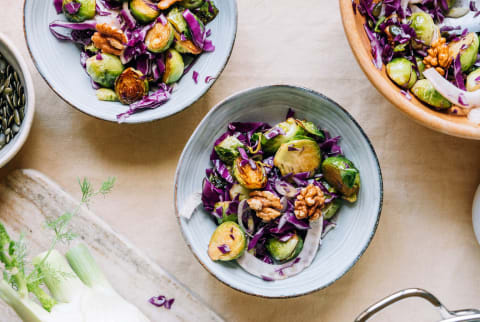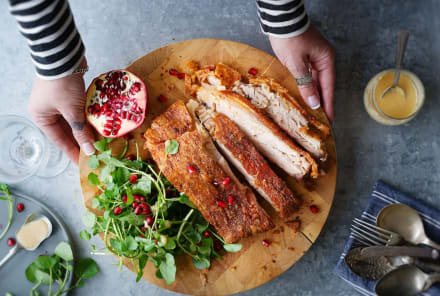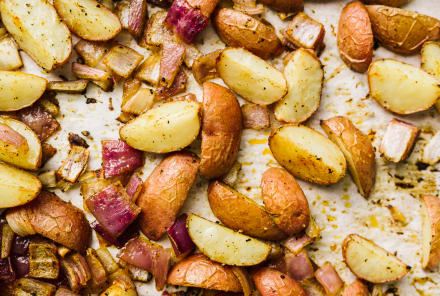Advertisement
So You Finished Whole30 — Now What? We Asked Whole30 Co-Founder Melissa Hartwig All Your Questions


We're obviously huge fans of Whole30 here at mbg and have shared everything from what the experience is actually like to the best breakfasts to eat while you're on it. But what happens when the 30 days are over? How do you maximize the results of the program?
To answer our biggest Whole30 transition questions, we went straight to the source, Whole30 co-founder and mbg Collective member Melissa Hartwig Urban. One of Urban's many best-selling books, Food Freedom Forever, is coming out in paperback on February 1, and it's designed to help turn Whole30 from a program into a lifestyle. Here's what she said.
mbg: What if I don't react to anything during reintroduction—does that mean I don't have intolerances?
Melissa Hartwig Urban: It could! It's entirely possible that things like white rice, Parmesan cheese, or even a slice of toast won't bring up any discernible effects. But that doesn't guarantee those foods never will! Reintroduction is truly a lifelong process, as the effects of these foods might be subtle, cumulative, or purely psychological in nature. For example, I can eat toast with breakfast one day and I really don't notice much, but if I do it two days in a row, I get bloated and sad. (Really. Gluten makes me sad.) Pay attention during the reintroduction period, but KEEP paying attention in your food freedom to help you make better "worth it" decisions.
mbg: How much of a food do I need to consume in a day to see if I will react?
MHU: It depends. A splash of cream in your coffee might not be enough to discern any effects, but you don't have to eat a whole pint of ice cream either! We recommend one serving of the reintro food group with each meal, but certainly eat less (or stop!) if you notice negative effects like digestive issues, a migraine, or joint swelling immediately following your first meal.
mbg: If I am reacting—bloating, stomach pains etc.—what can I do to alleviate it?
MHU: It depends. (I'm going to say that a lot.) Sometimes following doctor's orders can help (like taking your prescribed migraine medication, or an OTC allergy medication), but with other symptoms like bloating or breakouts, you just have to wait it out. This is why we have you return to the Whole30 for a few days after each reintroduction group; so if you do react, you'll have a few days between to let symptoms settle down before reintroducing something else. (You don't want them piling up!)
mbg: If I did Whole30 just to "reset" but I don't feel like I had intolerances to begin with, do I still need to "reintroduce" food groups or can I just go back to cheese and crackers?
MHU: You must reintroduce by the books every single time...with a few exceptions. First, if you know from previous Whole30s that a food is literally never worth it because of the effects, feel free to skip it this time. (We're not masochists.) Second, if you just don't miss something, don't bother bringing it back in. (Me + black beans. Don't care. No need.) But for everything else, you must reintroduce. Each elimination plus reintroduction helps you take your awareness a little deeper and make even more refined "worth it" decisions in your food freedom, which means you'll be better at navigating life after Whole30 with each reintroduction period.
mbg: If I eat sugar and drink wine again, will my system immediately go back to how it was before, making my Whole30 a waste?
MHU: Nope...but your brain might. If you've spent the last 30 days balancing your blood sugar or healing your gut, one meal isn't going to undo all that progress. (You might feel junky temporarily, but the body will be fast to return to its happy balance.) But if you awaken your Sugar Dragon, you may find old habits and thoughts around food resurfacing. That's also why each reintro day is followed by a few days back on the Whole30; so if your wine or chocolate sends you seeking to fall face-first in a pile of carbs and sugar, the rules of the Whole30 will give you a few days to settle down and evaluate the place (and time, and amount) those foods or drinks should have in your food freedom.
mbg: How often do you recommend doing Whole30? Is there such a thing as too often?
MHU: Only do a Whole30 when you really need it. The point of the Whole30 isn't to reset again and again, it's to use what it teaches you to live your own perfect food freedom plan. The longer you stay in your food freedom, the better! If you find yourself slipping out of your new healthy habits, see if you can rein it in using your own rules. (I'll do this after a book tour: "I don't need a full Whole30, but I do need two weeks with zero peanut butter cups or gluten-free toast.") The Whole30 will be there if you really need it, in which case, come back, reset again, and make your "worth it" decisions that much more effective. But don't use the Whole30 like a crutch, a life preserver, or a trampoline.
mbg: How often do you do Whole30?
MHU: I haven't done a full Whole30 in at least three years. I haven't needed it; I've been successfully navigating my food freedom and have been able to get myself back on track after vacations, holidays, or book tours without the need for a full reset.
mbg: What's your favorite food to reintroduce?
MHU: Sushi, with all the fixings. It's my favorite food, and having to avoid the white rice or splash of tempura flakes has to be the hardest part for me!
mbg: What's the first meal you eat post-reintroduction?
MHU: It depends. We have a set reintroduction schedule for those who want structure, in which you'll reintroduce legumes (like tofu, black beans, peanut butter, or hummus) first. But we also offer a "slow roll" schedule for those who want to ease into reintroduction slowly—in which case, you decide what you want to reintroduce first. The most important thing to remember is to reintroduce only one food group at a time, so you can easily discern the impact that particular food group has on your body and brain.











